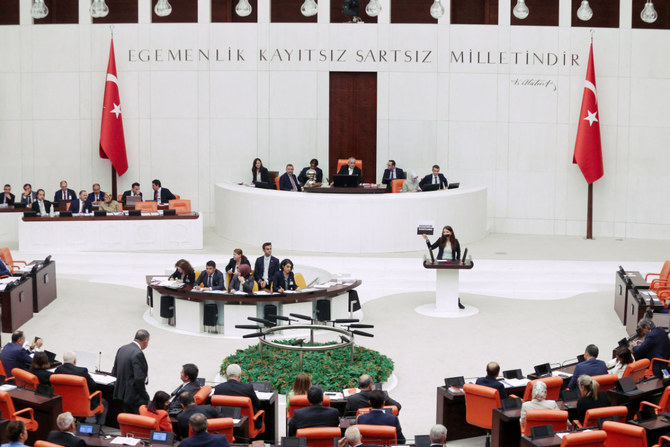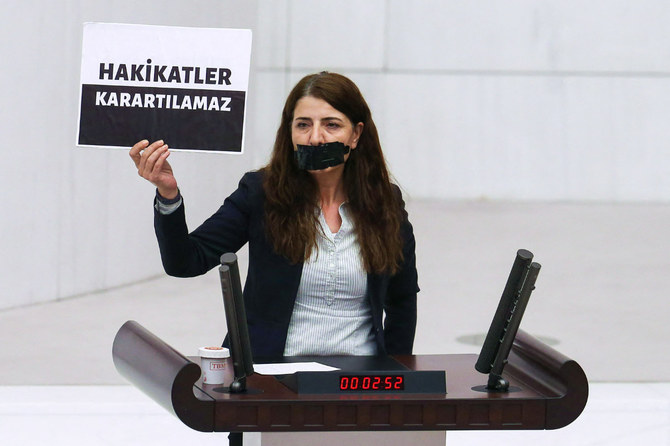ANKARA: Turkey’s main opposition group said on Friday it would ask the top court to throw out new media legislation that would jail people for spreading “misinformation,” calling the measures unprecedented censorship.
Parliament adopted the law late on Thursday after it was proposed by President Tayyip Erdogan’s ruling AK Party (AKP), which says it aims to regulate online publications, protect the country and combat disinformation.
The bill had drawn criticism from Turkey’s Western allies and rights groups who said its vague reference to “false or misleading information” can be interpreted differently by courts to punish those critical of the government.
The law’s Article 29 says those who spread false information about Turkey’s security to “create fear and disturb public order” will face a prison sentence of one to three years. The bill still needs to be approved by the president.
“We are talking about a law that is the most oppressive in our history and the law that contains the most censorship,” Burak Erbay, a member of the opposition Republican People’s Party (CHP), said.
He said the party would file an application to the Constitutional Court as soon as the “Law on Amending the Press Law” was published in the Official Gazette.
“We believe the biggest censorship law in history will be reversed by the Constitutional Court and this law will be annulled. It is a regulation that takes us down to the level of underdeveloped societies,” Erbay told Reuters.
The AKP’s nationalist allies MHP joined it in voting to approve the bill, while opposition parties opposed it.
The AKP has dismissed the criticism and says it opposes censorship, adding the law aims to protect everyone from false accusations on social media.
The pro-government Sabah newspaper said a “safe era” in social media had begun. It said the regulations would improve national safety by allowing the immediate removal of content that would endanger public peace.
Hundreds of journalists have been jailed in a crackdown following a 2016 coup attempt, mainly on terrorism charges. Ankara has defended the measures as a necessary response to the scale of the security threat facing Turkey.
People have also been tried over social media posts including ones that criticize Turkey’s incursions in Syria or are seen as insulting the president, considered a crime in Turkey.
Ozgur Ogret, Turkey representative for the Committee to Protect Journalists, said the new law poses a danger not only for journalists but all citizens and could increase self-censorship ahead of elections set for next year.
“This law will hinder the free flow of information in the election atmosphere,” he said after a press freedom event organized by the International Press Institute in Istanbul.
“Freedom of expression is always important but in an election atmosphere, it is really crucial for everybody to speak their minds and voters to decide on solid information.”
Election polls show Erdogan could lose to an opposition candidate if a presidential election were held today — and that the opposition bloc would win a majority in parliament.
Arda Guzel, a student in Ankara, said the new law aimed to stifle dissenting voices on social media and prevent the opposition from garnering more votes.
“Because people nowadays look at social media more than mainstream media, they can access negative news about the government faster,” he said.
“They passed this law to counter these news stories.”
Turkish opposition calls new media law ‘censorship’, will appeal to top court
https://arab.news/btc9t
Turkish opposition calls new media law ‘censorship’, will appeal to top court

- Parliament on Thursday adopted the law with a vague reference to “false or misleading information”
- The opposition warned that the measure could be used by those in power to punish critics
Thousands stage pro-Gaza rally in Istanbul

- Thousands joined a New Year’s Day rally for Gaza in Istanbul Thursday, waving Palestinian and Turkish flags and calling for an end to the violence in the tiny war-torn territory
ISTANBUL: Thousands joined a New Year’s Day rally for Gaza in Istanbul Thursday, waving Palestinian and Turkish flags and calling for an end to the violence in the tiny war-torn territory.
Demonstrators gathered in freezing temperatures under cloudless blue skies to march to the city’s Galata Bridge for a rally under the slogan: “We won’t remain silent, we won’t forget Palestine,” an AFP reporter at the scene said.
More than 400 civil society organizations were present at the rally, one of whose organizers was Bilal Erdogan, the youngest son of Turkish President Recep Tayyip Erdogan.
Police sources and Anadolou state news agency said some 500,000 people had joined the march at which there were speeches and a performance by Lebanese-born singer Maher Zain of his song “Free Palestine.”
“We are praying that 2026 will bring goodness for our entire nation and for the oppressed Palestinians,” said Erdogan, who chairs the board of the Ilim Yayma Foundation, an educational charity that was one of the organizers of the march.
Turkiye has been one of the most vocal critics of the war in Gaza and helped broker a recent ceasefire that halted the deadly war waged by Israel in response to Hamas’s unprecedented attack on October 7, 2023.
But the fragile October 10 ceasefire has not stopped the violence with more than more than 400 Palestinians killed since it took hold.















